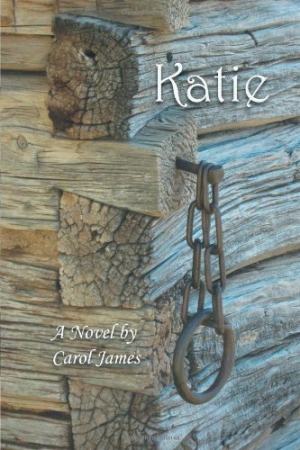It looks like you've stumbled upon a page meant to be read by our code instead of viewed directly. You're probably looking for this page.
Katie
Battered women often feel trapped in their marriages. Carol James’ Katie, a Western romance set in both Dodge City and Denver following the Civil War, follows one such woman as she finds the courage to break the cycle of abuse.
Katie Rawlings is raised by an abusive father whose twisted games cause her to rebel against becoming “weak” like her mother. Her rebellious nature serves Katie well, as it turns out, when her father sells her, at the age of sixteen, to a brothel. When she refuses to entertain the men, however, the establishment’s madam allows her to serve as a housekeeper instead. Katie’s only hope for escape is her marriage to Phillip Lawson—a union, which, to her horror, turns out to be the sort of nightmare she’d tried to avoid. Even his death doesn’t free her; when the right kind of guy does come along, Katie has become so mistrustful that she nearly pushes him away.
The genius of this story lies in James’ ability to see into the psyche of abused women. At eleven years old, Katie tells her mother that, “It doesn’t matter what you say…it’s not his right to hit you and push you.” The reader follows Katie as she descends from a hopeful teenager to a cautious woman who has no reason to believe in true love. Later, when she realizes her sister-in-law, Daria, is in an abusive marriage, she asks, “How do you stay with him?” Daria replies, “I have learned to cope.” Yet Katie clings to her dreams—even while in jail awaiting trial for Phillip’s murder, she cannot guard her heart completely against the sheriff’s unexpected kindness.
Throughout the book, James showcases the ability to hope beyond reason, as in the case of Bones, a gentle giant of a man who protects the girls at the brothel regardless of the cost to his own health. Even Daria, who doesn’t have the strength to leave her brutal husband, helps Katie when she needs it most. Each juxtaposition of good and bad catapults Katie further toward her goal of finding true love.
James uses deliberate symbolism to highlight her social themes. For example, doing the right thing by staying kind in the midst of turmoil causes Bones to develop heart disease—the heart being a literal representation of Katie’s circumstances. And using Daria as a foil serves to mirror her sister-in-law’s situation and highlight what could happen if Katie surrenders hope.
The main characters are well developed, but the minor characters are too similar. Most of the older women in this book are “matronly.” Ranch hands are either violent souls who obey senseless orders, or they fall in love with the wife of their boss. The husbands in this story are bloodthirsy men who crave the submission and humiliation of their wives. Frequent misspellings and punctuation errors slow down the story. Even so, the novel is full of action and well-researched details that add to its historical authenticity. Readers looking for a redemption story or a romance novel will enjoy Katie.
Reviewed by
Emily Asad
Disclosure: This article is not an endorsement, but a review. The publisher of this book provided free copies of the book and paid a small fee to have their book reviewed by a professional reviewer. Foreword Reviews and Clarion Reviews make no guarantee that the publisher will receive a positive review. Foreword Magazine, Inc. is disclosing this in accordance with the Federal Trade Commission’s 16 CFR, Part 255.
